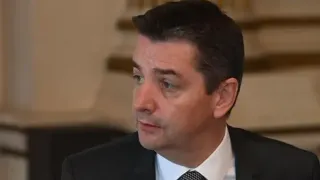March 30, 2023
Gwyneth Paltrow's Ski Collision Trial Spawns Memes, Intrigue
Sam Metz and Anna Furman READ TIME: 4 MIN.
When two skiers collided on a beginner run at an upscale Utah ski resort in 2016, no one could foresee that seven years later, the crash would become the subject of a closely watched celebrity trial.
But Gwyneth Paltrow's live-streamed trial over her collision with Terry Sanderson, a 76-year-old retired optometrist, in Park City has emerged as the biggest celebrity court case since actors Johnny Depp and Amber Heard faced off last year – spawning memes, sparking debate about the burden of fame, and making ski etiquette rules of who was uphill and who had the right of way relevant beyond those who can afford resort chairlift tickets.
As attorneys finished questioning witnesses Wednesday and prepared for closing arguments Thursday, here is a look back at highlights from the two-week trial:
LIFESTYLES OF THE RICH AND THE FAMOUS
For seven days, attorneys have highlighted – and downplayed – Paltrow and Sanderson's extravagant lifestyles.
Sanderson's attorneys are asking for more than $300,000 in damages, but the money at stake for both sides pales in comparison to the typical legal costs of a multiyear lawsuit. Both sides have marshalled brigades of expert witnesses, including a biomechanical engineer and collision expert.
Paltrow's legal team has attempted to represent Sanderson as an angry, aging man who continued to travel internationally after the collision. They introduced photos into evidence of Sanderson camel riding in Morocco, trekking the Inca Trail to Machu Picchu in Peru, and taking a continent-wide loop through Europe with stops in the Netherlands, Germany, Switzerland, Italy, France and Belgium.
Sanderson's attorneys have questioned Paltrow about that day's $8,890 bill for private ski instructors for four children accompanying her, as well as her decision to leave the slope after the crash to get a massage. They've said the accident caused Sanderson to grow distant from friends and family, and they called his ex-girlfriend to testify about how their relationship deteriorated because he "had no joy left in his life."
To keep jurors engaged, Paltrow's team shared a series of advanced, high-resolution animations to accompany their witnesses' recollections. The renderings reflect the financial investment Paltrow and her defense team are devoting to the case.
THE BURDEN OF FAME
Attorneys on both sides have tapped into the power of celebrity to make their cases that reputations and moral principles are what's at stake in the trial.
Sanderson's side has tried to characterize Paltrow, the actor-turned-lifestyle influencer, as clumsy, out of touch, and evading accountability. They likened her decision to file a $1 countersuit against Sanderson to Taylor Swift, who filed a similar counterclaim in a lawsuit in 2017 – drawing attention to Paltrow's testimony that she was "not good friends" with Swift but just "friendly."
Paltrow's defense team has called the highly publicized case an attempt to exploit her fame and suggested that she's vulnerable to unfair, frivolous lawsuits. They've questioned witnesses about Sanderson's "obsession" with the case and homed in on an email subject line in which Sanderson wrote after the collision: "I'm famous."
"To become famous, he will lie," one of Paltrow's attorneys said. "I'm not into celebrity worship," Sanderson later rebutted.
FACTORY OF MEMES
Though the trial has tested the jury's endurance as its eight members have gradually sunk deeper into their chairs through hours of expert-witness testimony, it has titillated spectators worldwide, become late-night television fodder and fed the internet's insatiable appetite for memes.
Viewers tuning into proceedings on CourtTV have seen Paltrow complain about losing a half-day of skiing after the crash and heard a radiologist testify that Sanderson could no longer enjoy wine tasting. They've compared the spectacle to "The White Lotus" – an HBO series that satirizes the petty grievances of rich, white vacationers – and, in a reflection of the courtroom theatrics and rapt public attention, likened Paltrow's defense to the Salem witch trials of Arthur Miller's "The Crucible."
Photographs of Paltrow entering and exiting the courtroom – often shielding her face, perp-walk style, with a blue GP-initialed notebook – also have gone viral on social media.
UTAH'S POSHEST SKI TOWN
The proceedings have drawn the world's attention to Park City, Utah, the silver boomtown-turned posh ski resort where Paltrow and Sanderson crashed and the trial has been held. The city annually hosts the Sundance Film Festival, where early in her career Paltrow would appear for the premieres of her movies, including 1998's "Sliding Doors," at a time when she was known primarily as an actor, not a celebrity wellness entrepreneur.
The jury and local residents who've braved blizzards to get to the courthouse each day have nodded along as attorneys referenced local landmarks like The Montage Deer Valley, the slopeside luxury resort where Paltrow got a massage after the crash.
The all-white jury is drawn from registered voters in Summit County, where the average home sold for $1.3 million last month and residents tend to be less religious than the rest of Utah, where the majority of the population belongs to The Church of Jesus Christ of Latter-day Saints.
Unlike the high-powered Hollywood attorneys that become household names at celebrity trials, both sides are represented by local lawyers. Paltrow's team specializes in medical malpractice suits, while Sanderson's lead counsel, Bob Sykes, is known in Salt Lake City for his work suing police departments. Sykes has attempted to play up his folksiness, referring to himself as "just a country lawyer" more than six times during the trial. After jurors were sent home on Wednesday, both legal teams joked about the trial lawyer gimmick.
THE MYSTERIOUS MISSING GOPRO
Paltrow's attorneys have intrigued the jury with questions about the collision potentially being captured on a helmet-cam video, though no footage has been included as evidence in the trial.
Sanderson's daughter testified this week that an email she sent the day of the accident referring to a GoPro didn't imply footage existed. She said that she and her father speculated that on a crowded beginner run, someone wearing a camera must've turned to look at the crash after hearing Paltrow scream.
Internet sleuths following the trial later found and sent attorneys the link included in the email. Rather than revealing GoPro footage though, it contained a chatroom discussion between members of Sanderson's ski group, including the man claiming to be the sole eyewitness who testified Paltrow crashed into Sanderson.
__
Furman reported from Los Angeles.






